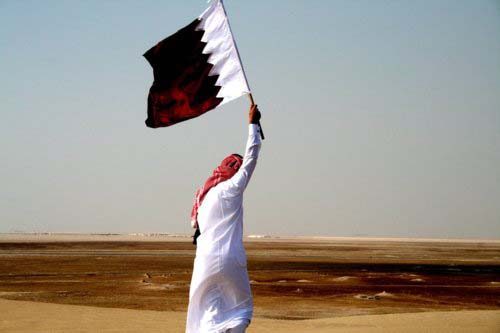It must not be easy to orchestrate a fake protest.
It must, in fact, have taken enormous amounts of forethought, motivation and resources to do what the Qatar Revolution Facebook group did on Friday, and continues to do.
The group, which appears to consist of mainly pro-Syrian government supporters and critics of Al Jazeera, has doubled to more than 41,000 likes over the weekend.
In addition to blanketing Twitter and Facebook with false news reports, the “revolution” was broadcasted on Syrian news network Addounia, as well as a fake news channel on Youtube called dohanewsnet.
Both the channel and the TV station aired footage of what they claimed to be Qataris gathering in central places around Doha, protesting peacefully, and then being tear-gassed and arrested by police.
It’s one thing to tweet about fake news – but to produce fake broadcasts? That entails taking the time to organize, direct and film a play, and then having the audacity to pass it off as news.
Qatar residents have poked a lot of fun at these fake protests over the past few days, but the big question still remains: why?
Why go through so much trouble to make Qatar look bad?
Tony Badran, a research fellow at the Foundation for Defense of Democracies, says it has everything to do with Al Jazeera:
Initially, Qatar’s formidable media tool – Al Jazeera – seemed to avoid in-depth, let alone critical, coverage of the uprising in Syria…
Then, seemingly out of the blue, Al Jazeera’s editorial attitude shifted. Journalistic sources speak of a directive from the higher-ups that effectively gave the green light to let loose. Al Jazeera’s coverage went beyond airing the graphic videos of Assad’s brutal assault against his people to hosting Syrian human rights activists and dissidents on its widely-viewed shows, at times facing – and shaming – apologists for the regime…
But the worst offense from Assad’s perspective was when another Doha resident, and host of an Al Jazeera show, Sheikh Yusuf al-Qaradawi, put his weight behind the anti-regime protests and also lashed out at Assad for treating Syria like “an estate” that he “inherited from [his] father.”
And that’s all it took.
Qatar, formerly one of the few countries who helped Syria emerge from the international isolation imposed on it in 2005, became one of the Syrian government’s worst enemies, Badran says in a recent piece for NowLebanon.
Like a jilted ex-boyfriend, Syria cut off economic relations with Qatar and now makes it its mission to denounce Qaradawi, who, says Badran, represents a new looming geopolitical reality.
To Syria, Qaradawi is Egypt, and “If the past tells the Syrian rulers anything, Cairo’s resurgence will come at Damascus’ expense,” Badran says.
Fear and revenge, then, may be the primary motivators for these elaborate campaigns against Qatar.
There has been no mention of the possible escalation of such campaigns, but it is a common-sense concern. Whether Qatar has prepared for that concern is unknown – local newspapers and the government news agency have made no mention of Friday’s online campaign.
Read Badran’s full analysis here.
And tell us what you think: Should Qatar take groups like the one that organized Friday’s fake protests seriously?








